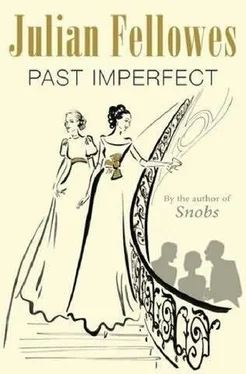I was quite late arriving, as it happens, so the hubbub of chatter was what guided me through the fair and past the stalls, until I came to a temporary white-painted wicket fence, where two officials guarded the entrance and a large card on a blackboard stand announced that the Dodgems were ‘closed for a private party.’ This ensured some glares from would-be customers, which Georgina’s guests affected to ignore, but these disgruntled few did not spoil things. Whatever they may pretend, the privileged classes, then and now, enjoy a bit of envy.
Some of the girls were already in the cars, shrieking and laughing and spilling their wine, as their boyfriends-for-the-night posed and preened, banging and whacking into the cars of others. Nowadays there would be signs requesting that glasses should not be taken on to the track, or there would only have been plastic cups anyway, but I do not recall anyone concerning themselves with such things as slippery surfaces or broken glass. There must have been plenty of both. A marquee with an open side had been erected to accommodate the other guests who were already well away. I looked round for Georgina, hoping to find her at the centre of a grateful crowd, but as usual she was standing alone and silent near the champagne table, so I saw the chance to fetch a drink and simultaneously greet my hostess, killing two birds with one stone.
‘Hello,’ I said. ‘This all seems to be satisfactorily rowdy.’
She smiled wanly. ‘Are you going to have a go?’
‘Oh, I think so.’ I smiled gamely. ‘What about you?’ But she did not seem to hear my question, her eyes fixed on the track itself, and I could now make out a car with the distinctive figure of Damian crouched over the controls. His co-pilot appeared, from a distance anyway, to be rather an unlikely one. Her face was almost concealed by a curtain of curls, but I could see how calm she was, and unattached. She did not shout like the others, but merely sat there, like some stately princess forced to endure the indignity of a peasant’s ferry in order to get to the other side.
Georgina turned. ‘What’s your dinner in aid of?’
I was nonplussed. ‘What dinner?’
‘Tonight. Damian said he couldn’t come to the Ritz with us because he’d pledged himself to you.’
I realised at once the significance of this, that poor Georgina had already fulfilled her function in Damian’s life by getting him started and could now be dispensed with. The doomed girl had yielded to his flattery and friendly charm, and opened the door for him into this world, but now, having gained entry, he had no compunction in leaving her to her own devices. So Georgina’s dream of having this new and glamorous companion sitting next to her at the dull, staid dinner that would have been arranged by her mother for a favoured few was to be shattered. As to the fib that had got him out of it, I blush to say I covered for him. In my defence, this was not really by choice but entirely in obedience to natural impulse. When any woman talks of a man’s excuse to another man, he is somehow bound to support the fiction as part of a kind of race loyalty. ‘Robert says you’re having lunch with him next week’ forces any male to respond with something along the lines of ‘I’m looking forward to having a good catch-up,’ even if it’s the first he’s heard of the plan. Often, afterwards, a man may chastise the friend or acquaintance who has brought this about. ‘How dare you put me on a spot like that?’ Even so, it is against male nature to speak the truth. The alternative would be to say, ‘I have never heard of this lunch. Robert must have a mistress.’ But no man can utter these words, even when he is entirely on the side of the woman being lied to. I smiled at Georgina. ‘Well, it’s just a dinner for a few of us. It’s not at all crucial, if you really need him.’
She shook her head. ‘No, no. I don’t want to mess things up. Daddy was annoyed when I asked him, anyway. That’s why I didn’t invite you,’ she added lamely. ‘He thinks we’re too many as it is.’ Too many duds, I thought, and not enough possibilities. But then, Damian would not qualify in this group. Mrs Waddilove was not in the market for an adventurer.
‘Who’s coming?’
‘I wish you were,’ she muttered obediently. ‘But as I say, it’s not a big party.’ I nodded. Having paid lip service to form, she listed half a dozen names. ‘Princess Dagmar. And the Tremayne brothers, I think, but there may be a problem.’ I bet there will be, I thought. ‘Andrew Summersby and his sister.’ She ticked off these people in her head, although the list carried her mother’s fingerprints, not her own. ‘That’s about it.’
I glanced over to where the lumpen, red-faced Viscount Summersby stood glumly nursing his drink. He had apparently abandoned any efforts at conversation with his neighbours. Their state was no doubt the more blessed. Meanwhile, in front of him, his sister, Annabella, was shrieking and shouting as she tore round the track, a pale and lean companion trembling beside her. Her tight cocktail frock, raided from her mother’s post-war wardrobe, seemed to be bursting at the seams as she wrenched the wheel this way and that. Annabella Warren was not a beauty any more than her brother but, of the two and if forced to choose, I preferred her. Neither was an enticing prospect for an evening’s entertainment, but at least she had a bit of go. Georgina, following my gaze, seemed silently to agree. ‘Well, good luck with it,’ I said.
The dodgem cars had stopped and the drivers and passengers were being forced from their vehicles by the waiting crowd of guests surrounding the track, anxious for their turn. They had a distinctive look, those girls of long ago, racing across the metal, bolted floor to squeeze into the dirty and dented cars awaiting them, part 1950s Dior, part 1960s Carnaby Street, acknowledging the modern world but not yet quite capitulating to it. In the forty years that followed, that decade has been hijacked by the voice of the Liberal Tyranny. Theirs is the Woodstock version of the period – ‘if you can remember the Sixties, you weren’t really there,’ run the smug and self-regarding phrases – and they have no conscience in holding up the values of the pop revolution as the whole truth, but they are either deceiving or deceived. What was genuinely unusual about the era for those of us who were around at the time was not a bunch of guitar players smoking dope and wearing embarrassing hats with feathers, and leather singlets lined with sheepskin. What marked it apart from the other periods I have lived through was that, like Janus, it faced both ways.
One part of the culture was indeed about pop and drugs and happenings, and Marianne Faithfull and Mars Bars and free love, but the other, if anything far larger, section of the community was still looking back to the 1950s, back towards a traditional England, where behaviour was laid down according to the practice of, if not many centuries, at least the century immediately before, where everything from clothes to sexual morality was rigidly determined and, if we did not always obey the rules, we knew what they were. It was, after all, less than ten years previously that this code had reigned supreme. The girls who wouldn’t kiss on a first date, the boys who were not dressed without a tie, those mothers who only left the house in hat and gloves, those fathers wearing bowlers on their way to the city. These were all as much a part of the sixties as the side of it so constantly revived by television retrospectives. The difference being that they were customs on the way out, while the new, deconstructed culture was on the way in. It would, of course, prove to be the winner and as with anything it is the winner who writes history.
Читать дальше












